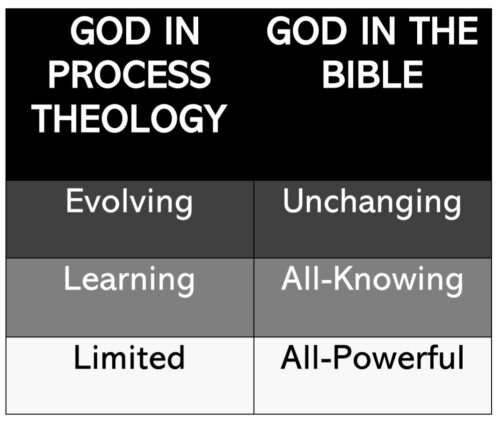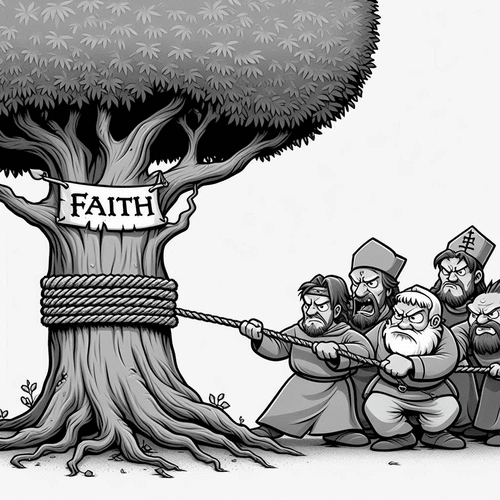Is God Still Learning? Fatal Flaws in Process Theology Exposed
Ever heard someone say, “Maybe God is learning along with us” or “God is growing and changing just like we are”? These seemingly comforting ideas reflect a modern theological movement known as Process Theology. While this perspective may appeal to contemporary sensibilities, it presents a fundamentally distorted view of God that contradicts Bible revelation and undermines the very foundation of our faith.
UNDERSTANDING PROCESS THEOLOGY: A MODERN REIMAGINING OF GOD
Process Theology emerged from the philosophical work of Alfred North Whitehead and was further developed by Charles Hartshorne. It has gained significant traction in progressive theological circles, offering a vision of God that seems more relatable to modern experience. But what exactly does it teach?
At its core, Process Theology claims God is constantly changing and evolving alongside creation. The view claims God learns from human experiences, adapts His knowledge, and grows in understanding. What’s more, Process theologians argue God doesn’t have absolute power over creation but instead, persuades and influences rather than controls. They suggest evil exists because God cannot prevent it, being limited in power and still developing in knowledge and understanding.
While these ideas may seem to offer comfort by presenting a more “accessible” deity, they severely diminish the God revealed in Scripture and create far more problems than they solve.
The Biblical Reality: An Unchanging, All-Powerful God
Scripture paints a radically different picture of God’s nature. Let’s examine what God’s Word actually reveals:
God’s Unchanging Nature: “I the LORD do not change,” declares Malachi 3:6, establishing one of the most fundamental truths about God’s nature. James 1:17 reinforces this, describing God as the Father of lights, “with whom there is no variation or shadow due to change.” This immutability isn’t a limitation but rather a perfection—God doesn’t change because He doesn’t need to. He is already perfect in every way.
God’s Complete Knowledge: The idea that God is learning alongside us collapses when we consider passages such as Psalm 139:1-6, which reveals a God who knows everything about us—past, present, and future. Isaiah boldly asks, “Who has measured the Spirit of the LORD, or what man shows him his counsel? Whom did he consult, and who made him understand?” (Isaiah 40:13-14). The clear answer is no one—God’s knowledge is complete and perfect.
God’s Absolute Power: Process Theology’s limited God bears no resemblance to the almighty Creator revealed in Scripture. Genesis begins with God speaking the universe into existence. As Jeremiah 32:17 proclaims, “Ah, Lord GOD! It is you who have made the heavens and the earth by your great power and by your outstretched arm! Nothing is too hard for you.”
THE PRACTICAL PROBLEMS: WHY PROCESS THEOLOGY FAILS US
- Can We Trust a Learning God? If God is still learning and developing, how can we trust His promises? A God who changes His mind based on new information He discovers cannot provide the unchanging foundation our faith requires. Scripture, however, assures us “God is not man, that he should lie, or a son of man, that he should change his mind” (Numbers 23:19).
- The Prayer Problem: Process Theology creates a critical dilemma regarding prayer. Why pray to a God who may be unable to help? The biblical model of prayer assumes we’re approaching an all-powerful, all-knowing God who can actually do something about our situations. Jesus taught us to pray, “Your kingdom come, your will be done,” not “Let’s figure this out together.”
- The Question of Salvation: Perhaps most critically, Process Theology undermines our assurance of salvation. If God is limited in power and knowledge, how can He guarantee our eternal security? The biblical promise of salvation rests on God’s unchanging nature and absolute power to save. As Paul confidently declares, “I know whom I have believed, and I am convinced that he is able to guard until that Day what has been entrusted to me” (2 Timothy 1:12).
THE BEAUTIFUL TRUTH: OUR UNCHANGING, ALL-POWERFUL GOD
The biblical view of God offers far more comfort than Process Theology ever can. Consider these truths:
- Because God doesn’t change, His promises are absolutely reliable
- Because God knows everything, His guidance is perfectly wise
- Because God is all-powerful, no problem is beyond His ability to solve
- Because God is sovereign, even our sufferings have purpose
This unchanging God provides an unshakeable foundation for our faith. When life seems chaotic, we can rest in knowing God isn’t scrambling to figure things out alongside us. He remains the same “yesterday and today and forever” (Hebrews 13:8).
FINDING REST IN GOD’S PERFECT NATURE
The appeal of Process Theology often lies in its attempt to make God more “relatable.” But we don’t need a God who relates to our limitations—we need a God who transcends them. We don’t need a God who is learning alongside us—we need a God who knows the end from the beginning and can guide us perfectly.
Scripture reveals exactly such a God—eternal, unchanging, all-knowing, and all-powerful. This God isn’t distant or unrelatable; rather, He is both transcendent in His perfection and immanent in His love. He doesn’t change because He doesn’t need to. He doesn’t learn because He already knows all things. He isn’t limited because His power is absolute.
In a world of constant change and uncertainty, there’s profound comfort in knowing our God remains eternally consistent, completely knowledgeable, and absolutely powerful. This is the God who deserves our trust, our worship, and our devotion.
Fatal Flaws in Process Theology—Related FAQs
If God doesn’t change, how do we explain Bible verses that say God “repented” or “changed His mind”? These passages use anthropomorphic language—describing God in human terms to help us understand His actions from our perspective. When Scripture speaks of God “repenting,” it describes a change in His actions toward humans based on His unchanging nature and previously stated conditions, not a change in His nature or plans. His eternal purposes remain constant, while His interactions with humans may appear to change from our limited temporal perspective.
- Doesn’t Process Theology better explain why God appears to take risks in Scripture (like with Adam and Eve or allowing Satan to test Job)? What appears as “risk-taking” from our perspective is actually the outworking of God’s perfect plan that includes human responsibility. God’s sovereign purposes encompass even the free actions of His creatures, making them certain without violating their nature as responsible moral agents. Scripture reveals that God works all things according to His will while maintaining genuine human responsibility.
- How does rejecting Process Theology account for genuine human freedom and responsibility? God’s sovereignty doesn’t eliminate human freedom but rather establishes it. Unlike Process Theology’s view where both God and we are limited by chance and circumstances, biblical theology shows God’s sovereign control creates the stable framework within which genuine human choice can operate. Our choices are real and significant precisely because they fulfil rather than frustrate God’s eternal plan.
Does Process Theology offer any valuable insights that traditional theology might have overlooked? While Process Theology rightly emphasises God’s intimate involvement with creation and the reality of human experience, it unfortunately distorts these truths by compromising God’s essential attributes. Traditional biblical theology already accounts for God’s intimate involvement through the doctrines of providence and immanence, without sacrificing His sovereignty and unchanging nature.
- How do we explain the incarnation of Christ if God cannot change? The incarnation doesn’t represent a change in God’s nature but rather the addition of a human nature to the Son’s person. In taking on human flesh, the eternal Son did not cease to be God or undergo any essential change in His divine nature. Instead, He united a complete human nature to His unchanging divine nature, fulfilling His eternal plan of redemption.
- If God cannot suffer or change, doesn’t that make Him distant and uncaring about human pain? God’s unchanging nature doesn’t mean He’s emotionally distant or uncaring. Rather, His immutability ensures that His love and compassion never fail or diminish. While God doesn’t suffer in the sense of being overwhelmed or damaged by pain, He knows our suffering perfectly and responds to it consistently according to His unchanging character of love and wisdom.
What’s the relationship between Process Theology and the modern emphasis on God’s love over His other attributes? The elevation of divine love at the expense of God’s other attributes reflects a modern tendency to remake God in our image. While God is indeed love, Process Theology mistakenly assumes this love must operate like human love—limited, developing, and subject to change. True divine love is perfect and unchanging, operating in harmony with all God’s other attributes, including His sovereignty and justice.
Fatal Flaws in Process Theology—Our Related Posts
Editor's Pick

Faithful to the Pattern: Why Paul Reserves Ordination for Men
Few topics in contemporary Christianity generate more tension than women’s ordination. This question touches real lives, genuine callings, and deeply [...]

‘Flee Sexual Sin’: Why Does Paul Single This Sin Out?
When the apostle Paul writes to the Corinthian church, he doesn’t tell them to simply avoid sexual immorality or resist [...]

Does Denying God’s Sovereignty Mean Denying the Gospel?
RC Sproul once warned denying God’s sovereignty “eviscerates” grace—a strong word meaning to gut or disembowel something, leaving only an [...]

Why Christians Fast: The Biblical Discipline’s Very Real Rewards
Why would Christians, who rejoice in the good gifts of food and fellowship, deliberately choose to go without? Isn’t fasting [...]

The Christian Sabbath: Why Did Sunday Replace Saturday?
Consider this: God-fearing Jews who’d faithfully observed Saturday Sabbath for over a thousand years suddenly began gathering for worship on [...]

Did the Early Christians Worship Jesus? The Biblical Evidence
It was a startling transformation: Jewish fishermen who'd spent three years following this itinerant carpenter from Nazareth now begin to [...]

If Jesus is Messiah, Why Aren’t ALL Messianic Prophecies Fulfilled?
If Jesus is truly the Messiah, why hasn't world peace arrived? Why do Jews still face persecution? Why isn't the [...]

When Courage Fails: Will I Be Forgiven If I Deny Christ in Persecution?
The rooster crowed, and Peter remembered. In that devastating moment, the apostle realised he’d just done the unthinkable—three times he’d [...]

What Makes a Godly Dad? 5 Biblical Principles Fathers Need
Modern culture sends fathers mixed messages. Be strong but sensitive. Be involved but not overbearing. Lead but don’t dominate. With [...]

What Makes a Godly Mom? A Scripture-Backed Guide
In our culture’s confusion about gender roles and parenting, the timeless question remains: what makes a godly mother? While secular [...]
SUPPORT US:
Feel the Holy Spirit's gentle nudge to partner with us?
Donate Online:
Account Name: TRUTHS TO DIE FOR FOUNDATION
Account Number: 10243565459
Bank IFSC: IDFB0043391
Bank Name: IDFC FIRST BANK






